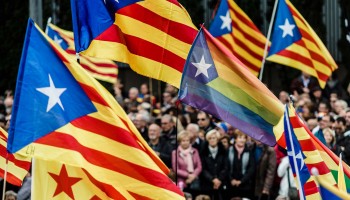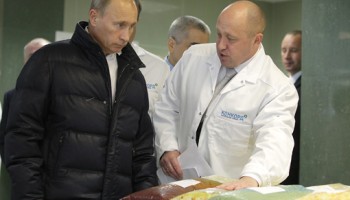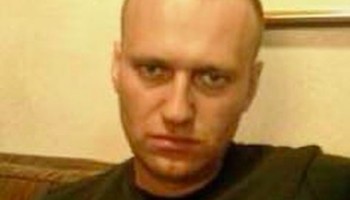In the run-up to Catalonia’s historic 2017 parliamentary vote to declare independence from Spain, the leader of the restive region received a shocking offer.
A mysterious “Russian group” reportedly offered president Carles Puigdemont money and 10,000 armed soldiers to make the break with Madrid.
This information emerged in 2020 in the Spanish media, but since then little more has been known about what exactly happened. Now, for the first time, a joint investigation by OCCRP, El Periódico, Bellingcat, IRPI, Il Fatto Quotidiano, and iStories reveals key new details about that offer, how it was made — and by whom.
As it turns out, Puigdemont met with men who presented themselves as envoys of the Russian government in the Casa dels Canonges, his official residence, on the eve of Catalonia’s independence vote.
Chief among his interlocutors was Nikolai Sadovnikov, whom Catalonian independence leaders privately described as “Putin’s envoy.” The former Soviet and Russian diplomat had a history of representing the Kremlin in sensitive conflict areas and had been noticed by at least one Western intelligence agency, which flagged him as having a direct line to the Russian head of state.
The involvement of a figure with Sadovnikov’s resume suggests that Moscow's efforts to foment division in Spain may have been more serious than previously known. Kremlin-watchers have long warned that President Vladimir Putin had come to believe that undermining European unity was in Russia’s interest.
Keir Giles, a Russia expert at the British think tank Chatham House, said Russia has a “zero-sum view of security,” believing that there’s only so much to go around.
“Therefore, if Russia weakens another country by eroding the population’s faith in institutions, by devolving its regions, by challenging its constitution, its democratic processes, its legal systems, then by comparison, Russian by default becomes stronger,” he said.
That Russia would do so by reaching out to separatist leaders in Spain is consistent with past behavior, said Louise Shelley, director of the Terrorism, Transnational Crime and Corruption Center at George Mason University in Virginia.
“The linkages between the Catalonians and the Russians go back to the Soviet era. Before the collapse of the USSR, high-level meetings were held in Barcelona with distinguished Russians," said Shelley.
“Things were more subtle then than sowing dissent. But relationships are built by Russians for the long term.”
But the affair also had some unexpected elements. Text messages obtained by reporters, as well as an interview with a person present at the meeting, reveal that the Russians demanded that Catalonia pass favorable cryptocurrency legislation in exchange for their support.
In turn, the Russians promised to give Catalonia $500 billion to aid their attempts to gain independence — a figure that strains credulity. Though Catalonia never became independent, a man representing the Russians stayed in touch and continued to promise funds in support of the separatists’ efforts. Most of his promises appeared to amount to nothing, though on one occasion the Catalonians received a single bitcoin, worth just under $10,000 at the time.
On being familiarized with reporters’ findings, Christopher Nehring, a lecturer in intelligence history at the University of Potsdam, said some of the Russian overtures to Catalonia seemed odd.
On the one hand, he said, some of the people the Catalonians were speaking to “obviously had an affiliation with Russian intelligence services.” On the other hand, “the alleged demand to turn Catalonia into ‘the Switzerland of cryptocurrency’ sounds like a business scam.”
“Combining both parts, it sounds like we’re looking at covert, intelligence-backed support for an separatist movement with a scam or fraud component on the side.”
Giles agreed that the Russian overtures to Catalonia looked like “a mixed operation between political interference and the drive for profit.”
“The close and intimate connection between political power and organized crime … is a defining feature of so much of modern Russia’s means of projecting power,” he said.
”It sounds like we’re looking at a covert, intelligence-backed support for a separatist movement with a scam or fraud component on the side.”
Christopher Nehring
Lecturer in Intelligence History
University of Potsdam
Reached by telephone, Sadovnikov strongly denied having any connection to the Russian government or any intelligence agencies, or offering anything to the Catalonians. He acknowledged that he had traveled to Barcelona in late October 2017 and had been taken to a meeting “by a friend,” but said he “didn’t really know” who was present because he doesn’t speak Spanish.
“I just sat and waited for him to finish,” he said of the encounter. “And then for him to take me to the sea.”
Asked whether he could identify Puigdemont from a photo, Sadovnikov said he doubted it — he had suffered a serious bout of COVID-19, he said, and his life was no longer the same. “In 2020 I practically died, and I’ve been born again,” he said.
Puigdemont did not respond to requests for comment for this story. His close associate, Victor Terradellas, who also attended the meeting, confirmed that the meeting took place and that a man named Nikolai, who reporters later identified as Sadovnikov, had participated.
How Reporters Identified Sadovnikov
‘Parallel Diplomacy’
The fact that a Russian offer to Puigdemont had been made and rejected was disclosed in 2020 by a Spanish judge who was investigating the diversion of public funds for the independence movement. The judge cited messages retrieved by police from the phone of Puigdemont’s close associate Victor Terradellas, but provided no further information.
When this news emerged, some Spanish publications treated it as a likely scam. The Russian Embassy in Madrid even mocked it on Twitter, suggesting sarcastically that the number of soldiers on offer was actually a hundred times larger.
But new information obtained by reporters — from text messages, interviews with knowledgeable parties, intelligence reports, and court records — provide a wealth of additional detail. Reporters were able to establish that the offer took place at a meeting with Nikolai Sadovnikov, and an attendee confirmed that Sadovnikov himself had made it.
Though much about Sadovnikov’s background remains shrouded in mystery, there is plenty to suggest he is more than an unscrupulous freelancer.
Тhe 64-year-old appears to have considerable experience in diplomacy. Diplomatic sources in Italy informed reporters that he served as a Soviet diplomat in Rome between 1984 and 1987 and as deputy consul in Milan from 1991 until at least 1995, first for the Soviet Union and then for Russia. According to records from the Russian Foreign Ministry, a person named Nikolai Nikolaevich Sadovnikov was identified as an employee at least until 2010. A conference agenda from 2007 identifies him as adviser with the ministry’s policy planning department.
By 2012, he had appeared on the radar of at least one Western intelligence agency. Reporters were able to review an intelligence report from that year that describes him claiming to have direct ties to Vladimir Putin.
The report describes Sadovnikov as “an actor of Russian parallel diplomacy in Syria and Iran.” Although he acted under the umbrella of the foreign ministry, “he is accountable only to the head of state, with whom he claims a certain proximity.”
According to the report, Sadovnikov “is involved in the Syrian, Iranian, Libyan dossiers and more generally in bilateral relations with the Gulf countries.” His goal, it says, was “to promote the convergence of interests between Russia and Iran in order especially to reduce American influence in the region.”
It mentions a trip to Iran in April 2012 and another the following month to the United Arab Emirates, where Sadovnikov is said to have accompanied Foreign Minister Sergei Lavrov and taken part in meetings about oil exploitation.
The report said it was a “credible hypothesis” that Sadovnikov was a Russian intelligence agent, but it could not establish that with any certainty.
Since 2012, however, Sadovnikov has garnered less interest. According to one of the intelligence sources, he was not considered “a file” who required close scrutiny.
By the late 2010s, he had moved on to another region — at least according to Piergiorgio Bassi, an Italian lobbyist who acted as a guarantor for a visa Sadovnikov requested in January 2016.
When reporters reached Bassi, he said that in 2016 and 2017 Sadovnikov was working as an adviser for strategic foreign policy to Russia’s Foreign Minister Sergei Lavrov and that he specialized in the Catalonian issue.
A Strange Meeting
Sadovnikov’s meeting with the Catalonians took place in Puigdemont’s official residence on the evening of October 26, 2017. The Catalonian parliament would vote for independence the next day, and Puigdemont was busy negotiating both with the Spanish government in Madrid and with his fellow Catalonians.
But he also made time for the memorable Russian rendezvous.
Sadovnikov was accompanied by two others: another Russian and a Spanish man who acted as interpreter. During the meeting, Terradellas confirmed, Sadovnikov offered Puigdemont 10,000 Russian soldiers if Catalonia became independent.
Sadovnikov also promised the government of an independent Catalonia the eye-popping sum of $500 billion, according to text messages and photographs obtained by reporters. The amount seems improbable, since the entire Russian state took in about $219 billion in revenues in 2017.
In exchange, the Russian delegation had a single request — for an independent Catalonia to pass legislation favorable to cryptocurrency. They wanted it to be a financial center on par with Switzerland, but for digital money.
The encounter ended with no firm commitments, and the Catalonians appeared puzzled by who they were dealing with.
In messages to colleagues, Terradellas referred to Sadovnikov as “Nikolay the mysterious” and even raised the possibility that had underworld ties.
“I already think they are mafia,” he wrote on the day after the meeting. “Or where is the difference between mafia and political power?”
Nonetheless, Puigdemont told Terradellas to stay in touch with the Russians.
The following day, the Catalonian parliament declared independence. It quickly became apparent their effort was a failure; Catalonia was not recognized as independent by Russia or any other major country. Some separatist leaders were arrested and sentenced to prison for sedition and misuse of public funds, while others, including Puigdemont, fled the country.
Still, their relationship with the Russians endured.
“I’ll Go On My Knees”
A key figure at the center of their communications was Jordi Sardà Bonvehí, a Spaniard who sources said acted as Sadovnikov’s interpreter during the Russian’s meeting with Puigdemont.
Sardà is an enigmatic figure with his own checkered background. In 2012, he presented himself in Ukraine as a representative of a Spanish gas company and signed a deal with Vladislav Kaskiv, then head of Ukraine’s state investment agency, to build a liquified natural gas terminal on the Black Sea coast. But the company, Gas Natural, denied any involvement and said that Sardà had never been their representative. This agreed upon terminal was never built. In an investigation into the affair, Reuters referred to Sardà as a ski instructor turned businessman.
Now, years later, Sardà appeared to have switched his focus to Russia. After accompanying Sadovnikov to his meeting with Puigdemont, he stayed in touch with Puigdemont’s associate Victor Terradellas, continuing to exchange text messages with him for many months. (Sardà declined to comment for this story.)
Nearly 200 pages of these messages, extracted from Terradellas’ phone by Spanish police as part of a broader investigation into the diversion of public money, were obtained by reporters.
In his lengthy exchanges with Terradellas, Sardà mentions Sadovnikov on multiple occasions, insinuating that he is an important decision-maker in Putin’s circles. He also portrays himself as an influential player with high-level connections — though little of what he promises ever appears to come to fruition.
In one exchange, Terradellas urgently asks Sardà to undertake an unknown action:
In response, Sardà seems to insinuate that big plans are afoot:
When Terradellas expresses doubt, Sardà tells him not to worry:
At one point, invoking a photoshopped image of Putin riding a bear that Terradellas had sent him, Sardà promises that the Russian leader would meet with the now-fugitive Puigdemont, whom he refers to using a nickname, ‘the child’:
No such meeting is known to have taken place. But a few weeks later, Terradellas tells Sardà that his support is critical:
Later on, Terradellas expresses envy of Sardà’s association with the powerful Russians:
During these months, the messages show, Sardà repeatedly dangled the promise of money in front of Terradellas.
Messages from March 10, 2018, show the two men discussing a potential transfer of 56 bitcoins, which would be worth just under $525,000 at the time. But when reporters traced the digital wallet Terradellas shared with Sardà, they found that it had received only a single bitcoin.
Terradellas repeatedly asked for updates about additional funds that had been promised to Catalonia: “Please tell me when,” he wrote, asking whether he had done something to offend Sardà and even offering him cigars. But more than one meeting in Catalonia seemed to fall through, with Sardà simply failing to show up.
On one occasion, Sardà sent him a photograph of a suitcase packed with euros, possibly an attempt to convince the Catalonian that large sums of money really were on offer.
A few days later, the messages show, Sardà and Terradellas finally met up in a Barcelona apartment. A few hours later, Sardà sent Terradellas a picture, perhaps just taken during their meeting, showing Terradellas holding what appears to be a deposit certificate at the Union Bank of Switzerland worth an astonishing $500 billion.
The exact purpose of the encounter is not clear from the messages, but it’s possible Terradellas was meant to show the photo to Puigdemont or other Catalonian leaders, proving that the Russian side had access to the vast sums of money they had promised.
The photo was extracted from the text message logs by reporters. Three specialists who reviewed the purported certificate said it looked like an obvious forgery, noting its poor printing quality, as well as spelling and grammar mistakes.
"The document is one hundred percent worthless,” said Daniel Thelesklaf, former head of the Money Laundering Reporting Office of the Swiss government. “Such fakes are often used in scams where people want to show off that they control such assets. And the fake is made very clumsily."
When reached by reporters and asked about his relationship with Sardà, Sadovnikov described him simply as a “friend” and said that visiting him was the reason he had come to Catalonia.
Asked about the money, Sadovnikov replied, “Do you know what $500 billion is? That’s practically the budget of the Russian state. And someone’s going to give the budget of the Russian state to Catalonia? Well, you know, it's not even absurd, it's just, you know, crazy.”
On Red Square
On searching Sadovnikov’s name in corporate records, reporters came across several firms in Russia. It’s unclear whether these companies ever conducted any actual business, but they appear to link him to the Russian government and to Italian bankers accused of fraud.
In Russia, Sadovnikov was a shareholder in four companies incorporated in 2004 and 2005 that had an unusual place of registration: 5 Red Square. This is the address, in the heart of Moscow, of the Middle Trading Rows, a historic complex of buildings that was then owned by the Ministry of Defense.
The significance of the connection, if any, is unclear. The firms were struck off the company registry at various points between 2011 and 2017.
In one of the companies, Onava Energy, his fellow shareholders were Ottavio A. Angotti and Antonio Mario Angotti. These appear to be the same father-and-son Italian bankers whose names were splashed across the pages of U.S. newspapers in the 1990s after they were prosecuted over their roles in the collapse of bank-like institutions known as thrifts.
The elder Angotti fled the U.S. after being dropped off at a cancer clinic in 1993 ahead of his sentencing and vanished, only to be arrested three years later in Hong Kong. He died in 2009.
In 1995, his son Antonio was sentenced to 41 months in prison for money laundering and fraud. Six years later, operating under the alias Tony Massei, he fled Estonia, where he was part of a group that fabricated a financial backer to win a large railway privatization contract. Today, he is listed on LinkedIn as working in the energy business in Hong Kong. He did not respond to requests for comment.
How and why the Angottis got tangled up with Sadovnikov remains a mystery. When reached by reporters, Sadovnikov denied ever owning any companies at all, though he mentioned that someone had once opened firms fraudulently using his name.
He also flatly denied ever having worked for the Russian state. And he stood by his story that was just another tourist drawn to Barcelona for tapas and tourism.
"My goal was just to be by the sea, to go swimming, to sunbathe,” he said. “And that’s basically all. That was the purpose of my trip.”
Karina Shedrofsky (OCCRP ID), Jacques Follorou (Le Monde), and Oliver Zihlmann (Tamedia) contributed reporting.








